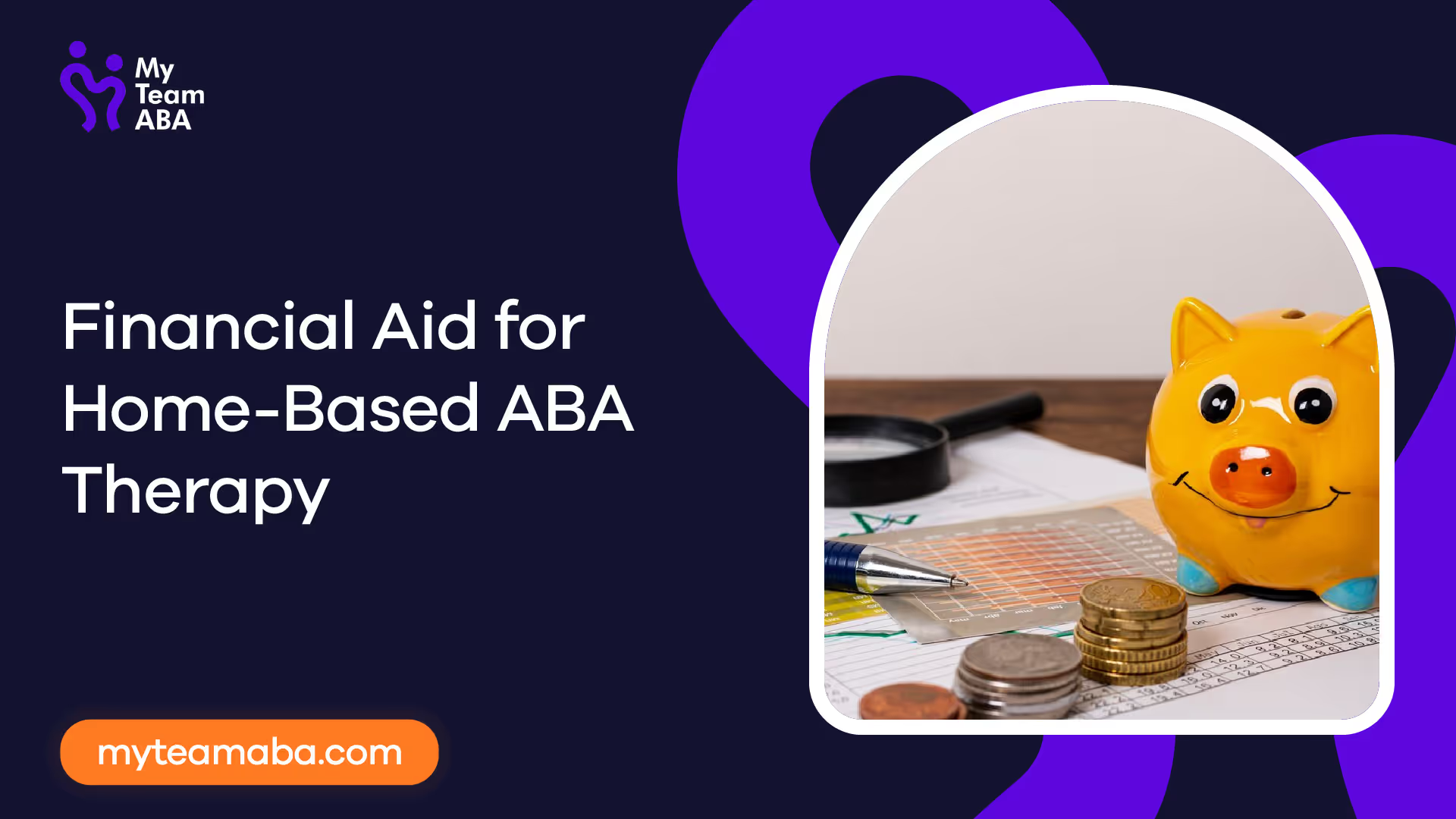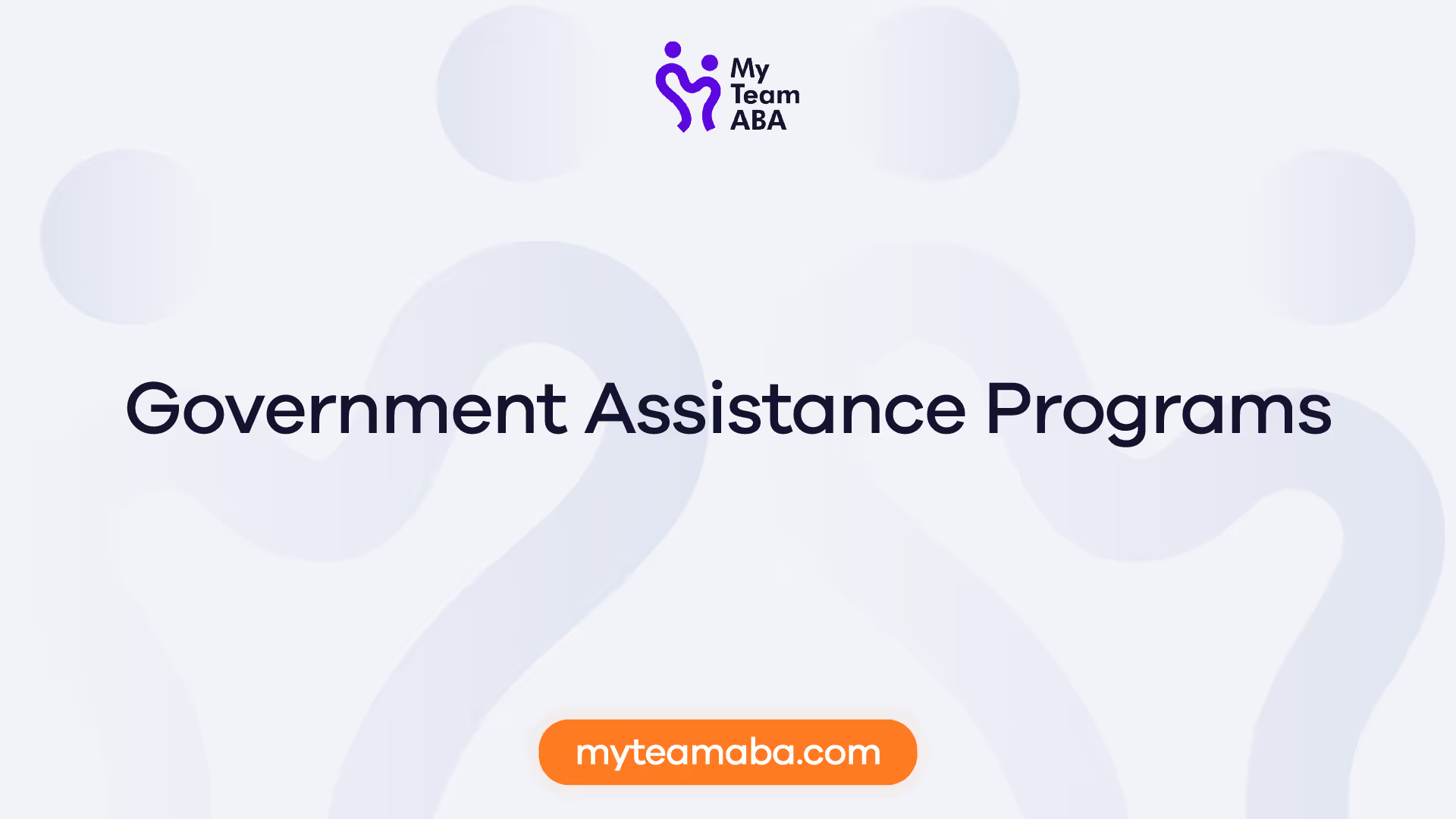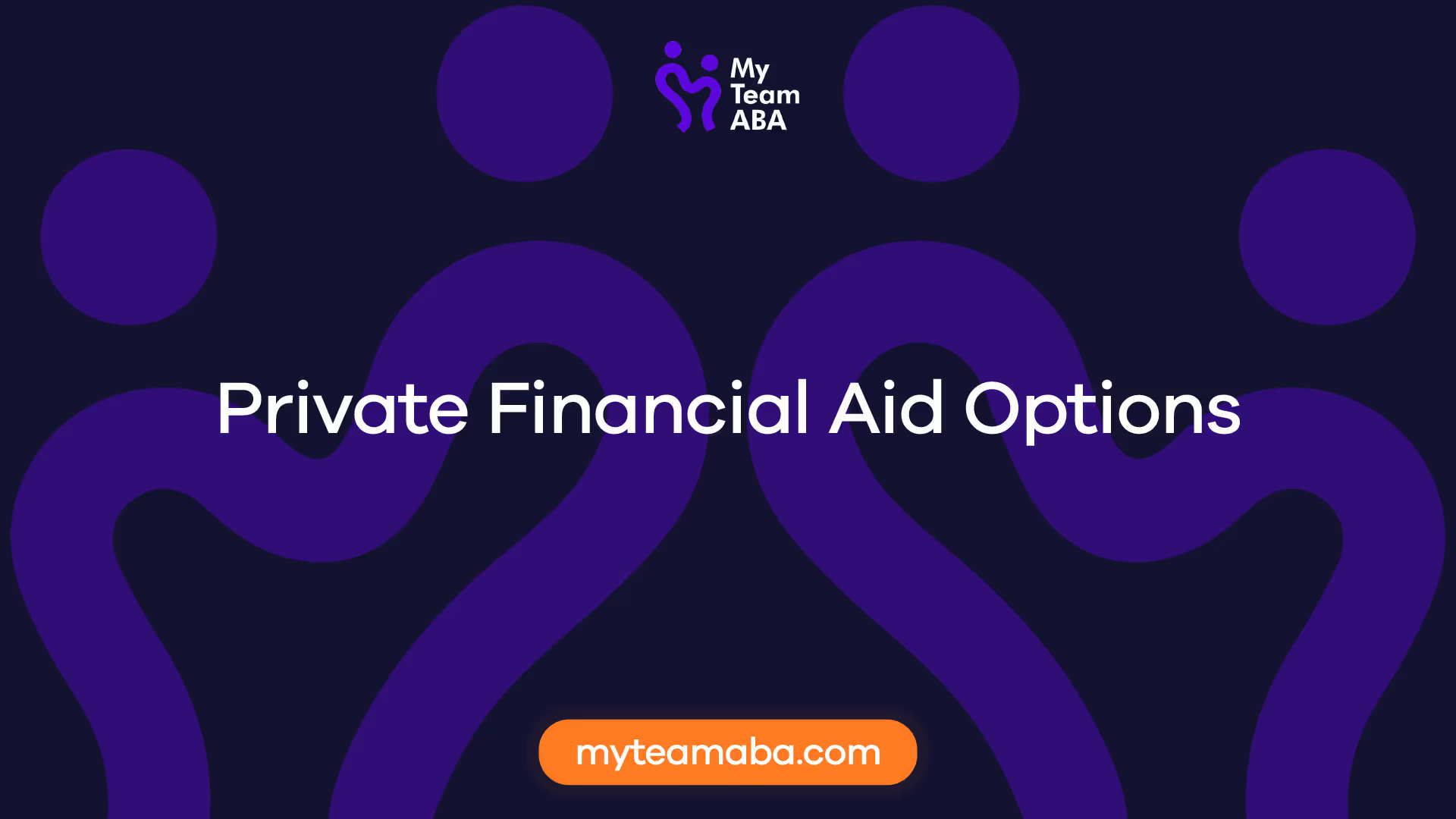Financial Aid for Home-Based ABA Therapy
March 12, 2025
Discover financial aid for home-based ABA therapy in Pennsylvania and Georgia. Navigate costs and assistance options now!


Financial Aid for ABA Therapy
Navigating the financial aspect of ABA therapy can be a significant concern for families seeking this specialized intervention. Understanding the costs associated with ABA therapy and exploring insurance coverage options are crucial steps in accessing the necessary support.
Understanding ABA Therapy Costs
The cost of ABA therapy can vary depending on various factors, including the duration and intensity of treatment, as well as the qualifications of the therapists involved. According to Golden Steps ABA, the annual cost of ABA therapy can range from $62,400 to $249,600. This translates to monthly costs between $4,800 to over $20,000, highlighting the significant financial commitment required by families.
When considering the expenses related to ABA therapy, it's essential to factor in not only the direct costs of the intervention but also any additional expenses such as transportation to therapy sessions, specialized equipment, and caregiver support. Assessing the overall financial impact of ABA therapy can help families plan effectively and explore available financial aid options.
Insurance Coverage for ABA Therapy
Insurance coverage plays a crucial role in mitigating the financial burden associated with ABA therapy. Most insurance companies cover ABA therapy for individuals with an autism diagnosis, with some requiring a supporting letter from the child's treating physician to outline the medical necessity of the treatment. Under the Affordable Care Act (ACA), mental health services, including ABA therapy, are required to be included in plans purchased through the Health Insurance Marketplace.
Medicaid plans also offer coverage for ABA therapy if prescribed by a doctor as medically necessary for children under the age of 21. State-funded health insurance typically covers the full amount of ABA therapy costs, although coverage details may vary based on the state of residence.
By exploring insurance coverage options and understanding the eligibility criteria and benefits provided by different insurance plans, families can access essential financial support for ABA therapy. Working closely with insurance providers and healthcare professionals can help navigate the complexities of insurance coverage, ensuring that individuals with autism receive the necessary therapeutic interventions without facing overwhelming financial hurdles.

Government Assistance Programs
When seeking financial aid for home-based ABA therapy, families with children on the autism spectrum can explore government assistance programs that are designed to provide support and resources. Two key programs that offer financial assistance for ABA therapy are Medicaid Waiver Programs and Supplemental Security Income (SSI).
Medicaid Waiver Programs
Medicaid waiver programs play a crucial role in offering financial assistance to families caring for a child with a disability, such as autism. These programs aim to provide funding for various services, including respite care, behavioral therapy, occupational therapy, and speech therapy, to support families in caring for their child at home and prevent institutionalization. To qualify for Medicaid waiver programs, families must meet specific income and eligibility criteria.
Supplemental Security Income (SSI)
Supplemental Security Income (SSI) is a federal program that provides financial assistance to individuals with disabilities, including children with autism who meet the program's requirements. Families seeking support from SSI must meet income and resource limits. If approved, they receive a monthly payment to assist with the costs associated with caring for the child. SSI benefits can be instrumental in covering the expenses related to ABA therapy and other essential services required for children with autism.
Government assistance programs like Medicaid waiver programs and Supplemental Security Income (SSI) play a vital role in supporting families in accessing the necessary resources and services for their child's ABA therapy. By understanding the eligibility criteria and application process for these programs, families can navigate the financial aspects of home-based ABA therapy more effectively.

Private Financial Aid Options
When seeking financial aid for home-based ABA therapy, families in Pennsylvania and Georgia can explore various private financial assistance options to help manage the costs associated with autism treatment. Private grants and organizations, along with ABLE accounts, offer valuable support in securing funding for therapy, equipment, and other autism-related needs.
Private Grants and Organizations
Private grants provided by organizations like Autism Speaks and other non-profit entities play a crucial role in offering financial assistance to families in need. These grants can help cover the expenses related to ABA therapy, specialized equipment, and other essential services required for autism treatment [1]. Families can apply for these grants through the respective organizations' websites or designated application processes.
Furthermore, private organizations often collaborate with local communities to organize fundraising events and awareness campaigns to support families affected by autism. These initiatives not only raise funds but also foster a sense of community and understanding among individuals impacted by autism.
ABLE Accounts
The Achieving a Better Life Experience (ABLE) Act of 2014 introduced ABLE accounts as a valuable financial tool for families of individuals with disabilities, including those requiring ABA therapy. ABLE accounts are private tax-advantaged savings accounts that enable families to save for long-term expenses without jeopardizing eligibility for public benefits such as Medicaid and Supplemental Security Income (SSI).
By opening an ABLE account, families can contribute funds to support the needs of their loved ones receiving ABA therapy while ensuring financial stability for the future. These accounts provide a secure and structured way to save and invest in a manner that safeguards the individual's eligibility for essential public benefits.
Exploring private financial aid options, such as grants from reputable organizations and the utilization of ABLE accounts, can significantly alleviate the financial burden associated with home-based ABA therapy. By leveraging these resources, families in Pennsylvania and Georgia can access the necessary support to ensure their loved ones receive the quality care and therapy they deserve.
State-Specific Financial Support
For families seeking financial aid for home-based ABA therapy, exploring state-specific options can provide valuable support in managing the costs associated with therapy. Here, we delve into the financial aid options available in Pennsylvania and Georgia.
Pennsylvania Financial Aid Options
In Pennsylvania, families of individuals with developmental disabilities can benefit from various financial assistance programs to support ABA therapy costs. One significant avenue is through Medicaid Waiver Programs, also known as 1915(c) Home and Community Based Services. These programs offer support services and care for individuals with developmental disabilities, allowing them to receive care at home or in the community, avoiding institutional care [3].
Additionally, Pennsylvania may provide cash assistance or participate in cash and counseling programs that enable parents to receive payment for providing care to their child with autism. The amount of financial aid received is typically dependent on income and family size, granting families more control over fund usage to cater to their specific needs [3].
Georgia Financial Aid Options
In Georgia, families can explore various financial aid options to support home-based ABA therapy. Medicaid Waiver Programs, similar to those available in other states, offer essential support services and care for individuals with developmental disabilities. These programs aim to keep individuals at home or in the community, providing necessary care and assistance [4].
Moreover, families in Georgia can also consider utilizing ABLE accounts. These private tax-advantaged savings accounts are designed for families of individuals with disabilities, allowing them to save for long-term expenses without affecting eligibility for public benefits like Medicaid and Supplemental Security Income (SSI). Contributions to ABLE accounts accumulate tax-deferred, and earnings are tax-free if used for qualified expenses.
By exploring and leveraging the state-specific financial aid options available in Pennsylvania and Georgia, families can access the necessary support to navigate the financial challenges associated with home-based ABA therapy. Understanding and utilizing these resources can help alleviate the financial burden and ensure individuals with developmental disabilities receive the essential care and services they need.
Additional Financial Assistance
When seeking financial aid for home-based ABA therapy, individuals and families in Pennsylvania and Georgia can explore various avenues to alleviate the financial burden. Two key sources of additional financial assistance are Community Action Agencies and Family Grant Opportunities.
Community Action Agencies
Community Action Agencies are non-profit organizations funded by state and federal sources, dedicated to supporting low-income residents with a range of assistance programs. These programs may include rental assistance, energy assistance, food programs, case management, education, and emergency assistance. By collaborating with Community Action Agencies, individuals can access a network of financial aid programs tailored to their specific needs and circumstances. These agencies act as valuable resources for connecting individuals with the necessary support systems in their communities.
For individuals seeking financial assistance for home-based ABA therapy, Community Action Agencies can offer guidance on available resources and programs that may provide financial relief. By leveraging the services provided by these agencies, families can navigate the complex landscape of financial aid and identify suitable options to support their ABA therapy journey.
Family Grant Opportunities
In addition to Community Action Agencies, families in Pennsylvania and Georgia can explore Family Grant Opportunities as a means of securing financial aid for home-based ABA therapy. These grants are often offered by organizations and foundations that aim to support families facing financial challenges associated with therapy and care for individuals with developmental disabilities.
Family Grant Opportunities can provide financial assistance for various aspects of ABA therapy, including therapy sessions, specialized equipment, and other related expenses. By applying for and receiving these grants, families can alleviate some of the financial strain associated with home-based ABA therapy and ensure that their loved ones receive the necessary care and support.
By tapping into Community Action Agencies and pursuing Family Grant Opportunities, individuals and families in Pennsylvania and Georgia can access additional financial assistance to facilitate their home-based ABA therapy journey. These resources can help alleviate financial stress and ensure that individuals with developmental disabilities receive the essential care and support they need to thrive.
Specialized Grants for ABA Therapy
For families seeking financial aid for home-based ABA therapy, there are specialized grant programs available to provide assistance with the costs associated with Applied Behavior Analysis (ABA) therapy. Two notable programs that offer support in this regard are Autism Care Today's Assistance Program and the CARE Family Grant Program.
Autism Care Today's Assistance Program
Autism Care Today's Quarterly Assistance Program, as highlighted by Autism Speaks, offers direct financial aid to families by covering expenses for various services that they may otherwise struggle to afford. The program extends its support to a wide range of services, including but not limited to ABA therapy, speech and occupational therapy, bio-medical testing, supplements, assistive technologies, safety equipment, social skills groups, and special needs summer camps.
Through this program, families can receive assistance in covering the costs of essential therapies and services that are crucial for the well-being and development of individuals with autism. By directly paying service providers, Autism Care Today's Assistance Program aims to alleviate the financial burden on families and ensure that individuals with autism have access to the care they need.
CARE Family Grant Program
The CARE Family Grant Program, as detailed by Autism Speaks, is dedicated to assisting families with various aspects of autism care and support. This program focuses on providing financial aid for medication, autism diagnosis and evaluation, therapy sessions (including speech, occupational therapy, and ABA therapy), and participation in autism summer camps.
Grants awarded through the CARE Family Grant Program are disbursed directly to vendors or service providers to cover expenses such as tuition, supplements, medication, medical evaluations, testing, and therapeutic services. By offering financial support for essential services and interventions, the CARE Family Grant Program aims to enhance the quality of life for individuals with autism and their families.
These specialized grant programs play a vital role in easing the financial strain that families may face when seeking ABA therapy for their loved ones. By leveraging the support provided by these programs, families can access the necessary resources and services to promote the well-being and development of individuals with autism. For more information on how to access these grant programs and other resources related to ABA therapy, explore our articles on getting the whole family involved in ABA therapy and evaluating home-based ABA therapy effectiveness.
